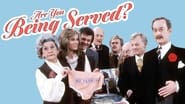bigverybadtom
And what do I mean by "everything"? The show's history:Originally the protagonist was supposed to be Mr. Lucas getting a job in the men's department at a department store, he has trouble with his job but somehow manages to survive. In the meantime, he is also a womanizer who tries to hit upon the younger female employee of the women's department. In trouble on his first day, he redeems himself when he was able to sell the senile store owner his own coat and impress his colleagues. Mr. Lucas, in short, was supposed to be the show's star.But as the show continued, Mr. Lucas ended up being just a side character, and the actor who played him was unhappy about that. Still, the show worked because the comedy involved the employees' interactions with the various customers as well as each other, malfunctioning automated store displays, having to sell inferior merchandise to customers ("It will ride up with wear!"), and so on. Some sexual innuendo features into this, but most of the humor involves the social systems of the various employees and customers.Problems did crop up as the show progressed. Mr. Lucas left the show, and his place was taken by an inferior character before his spot was simply eliminated. The same was true of the eldest men's department employee, with two replacements who also failed. Presumably the show had to be canceled before the remaining actors would die off.
Paul Evans
I'm now 30 years of age and grew up watching Allo Allo, 2.4 Children, Only Fools and Horses, One foot in the Grave etc, all of which I have wonderful nostalgic feelings for. I've always felt Brits make the funniest sitcoms, maybe i have an inbuilt British humour. Only in the last 2 years i bought series one of this to see what all the fuss was about, without any shadow of a doubt this is the funniest sitcom ever, no matter what mood i'm in i can put one of these on and laugh out loud, to the people who moan that the jokes were repeated i'd like to remind them of how many years this ran for and just how successful it was and still is. The movie was horrible, why did they make it!! However the sitcom all the way through was hilarious, Mollie and John i think made the series but all the cast were wonderful, especially young Mr Grace. There was an innocence about the series hidden deep amongst all the double entendres. High points for me were from the episodes Camping in, Oh what a tangled web and Friends and Neighbours. Maybe the show dipped a bit at series 9, but series 10 was a class act.
atomius
What makes this better than most modern britcoms is that it isn't so obsessed with good camera-work, graphics and movie style acting that really adds nothing to the humour itself. The style and culture involved reflects upper class British culture of the 1900s with hilarious, though now far outdated, satire on the British cast system. With an amusing cast of workers in the womens and mens departments at Grace Bros comes with it characters that have become stereotypes more than they poked fun at the original inspiration. The jokes, however repetitive, don't tire, more they relax, and it is easy to see why so much references to this show have been made. I would tell recommend it to anyone interested in 1900s culture, and it is an important part of television history, as are many 70s comedies. The simple theme intro with a equally simple guitar tune is quite interesting. Most humour is taken from outrageous costumes, hilarious backfirings of 'schemes' and devices and the coming together of all the workers despite their differences to fight longer working hours, bad meals, and other such conditions. The funniest jokes are when casts collide, often upsetting a high set person or upraising a lower one. All in all a brilliant comedy, well worth watching repeats of.
P_Cornelius
How delightful to see so many English/British contributors cock a snook at the Americans who like this very funny program. I suppose AYBS could never expect to achieve the Shakespearian heights of the likes of such English masterpieces as, say, Footballers' Wives, Coupling, or Mile High. Right? And poor old Mollie Sugden never did meet the standard achieved by Sarah Alexander and her likes. Right?Speaking of Mollie Sugden, if you can't appreciate her comedic genius, then you probably think Lucille Ball was a theatrical hack. Because Mollie Sugden IS the British Lucille Ball.Equally amusing is the criticism of John Inman's Mr. Humphries because a) he's a homosexual or b) he's too much of a homosexual. Sort of beside the point. And wrong. Because, while John Inman may indeed be gay, Mr. Humphries was never so much of a gay figure as he was a sissy, an asexual momma's boy. All of which, by the way, was made very clear in the follow up series, Are You Being Served Again/Grace and Favour.As much as I like the show, I do admit that after the death of Arthur Borough, the series lost its focus on in-store humor and became, to its detriment, more skit based. The episodes with Borough were exceptional. They created a sense of lifelong comradery of working together for years and years and years, where the store, or the company, was more of a "home" than home was. A feeling unimaginable in today's globalized hi-tech sweatshops.And, of course, if the show did recover somewhat from Borough's death, it never did get over losing Trevor Bannister's Mr. Lucas. Poor old Spooner (Mike Berry) became a mere afterthought until the very last episode of the series.All I can say is that if someone doesn't find anything funny in Mrs. Slocombe, Ernest Grainger, Capt. Peacock, Mr. Humphries and the rest, then they really don't have much of a sense of humor. Because at the root of the series is those characters' search for dignity and respect. And their frustrated endeavors would quickly find a sympathetic audience from at least one master of comedy. Because Charlie Chaplin's Tramp was built around the very same quest. I wonder if the British think Chaplin too crude and unsubtle for their tastes as well?




